![Leon Vitali with Anne-Katrin Titze on Stanley Kubrick and the casting of Danny Lloyd for The Shining: "I could make that boy [David Morley in Barry Lyndon] focus."](/images/newsite/Leon_Vitali_Anne-Katrin_Titze_600.webp) |
| Leon Vitali with Anne-Katrin Titze on Stanley Kubrick and the casting of Danny Lloyd for The Shining: "I could make that boy [David Morley in Barry Lyndon] focus." Photo: David Ninh |
Tony Zierra's exhaustive Filmworker, which had its world première in last year's Cannes Film Festival (Christopher Nolan will present 2001: A Space Odyssey on a remastered 70mm print this year), tackles the volatile and loving relationship of the most indispensable person in Stanley Kubrick's world. Through interviews that include Matthew Modine, R Lee Ermey, and Tim Colceri on Full Metal Jacket, Marie Richardson and Lisa Leone on Eyes Wide Shut, Ryan O'Neal on Barry Lyndon, Danny Lloyd on The Shining, and executive producer Jan Harlan (nephew of Veit Harlan and brother of Christiane Kubrick) we learn about the all-encompassing role Leon Vitali ended up playing in the life of the demanding film director.
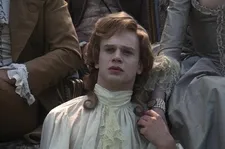 |
| Leon Vitali as Lord Bullingdon: "As an actor, when I was working on Barry Lyndon, I looked around and just saw all the detail that was going in just for one shot." |
We even get to hear Stellan Skarsgård and Pernilla August, who starred in Ragnar Lyth's television production of Den Tragiska Historien Om Hamlet - Prins Av Danmark, which was co-written by Jan Mark and Leon Vitali, share their memories in Filmworker.
At Kino Lorber in New York, Leon Vitali met with me on the afternoon of the theatrical premiere at Metrograph (Kubrick x 8) for a conversation that began where it all started for him with Stanley Kubrick, being cast as Lord Bullingdon in Barry Lyndon.
Anne-Katrin Titze: You say at one point in the film that "Every day was full of a lot of different jobs. I was in absolute heaven." It comes across that you did so many things that other people never get to do.
Leon Vitali: Yeah, exactly.
AKT: Was that part of the fascination?
LV: Oh yeah, yeah, I mean, it's such a, I think a blessing that I was fortunate enough. Because my whole thing was about wanting to learn how everything goes together.
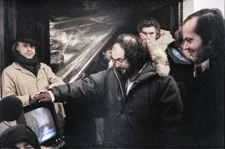 |
| Leon Vitali with Stanley Kubrick and Jack Nicholson looking at a take for The Shining |
I knew it wasn't just what was on the screen when you watched a movie. That was the thing. As an actor, when I was working on Barry Lyndon, I looked around and just saw all the detail that was going in just for one shot.
As Stanley used to say, "There's no such thing as a simple shot." You just felt it. There was such an atmosphere, you just felt that you were in the middle of doing something that made a contribution or a difference.
AKT: In the middle of creation, in other words?
LV: Yes, absolutely.
AKT: The most fascinating part of the documentary for me was about the work of the filmworker. People talk about your selflessness. To the extent of a "crucifixion."
LV: That's pushing it a little bit.
AKT: I thought so. I felt they are more talking about themselves than about you. They expose themselves and the limits of curiosity.
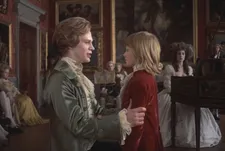 |
| Lord Bullingdon (Leon Vitali), Bryan Patrick Lyndon (David Morley) and Lady Honoria Lyndon (Marisa Berenson) in Barry Lyndon |
LV: I think Matthew [Modine] said it best when he said "I couldn't do that." Because it's an ego question for him, you know. That he wouldn't want to bury himself in that way. And it never bothered me.
AKT: It might also be laziness to an extent on their part, not just selfishness?
LV: Maybe.
AKT: That first meeting you describe so well. "Hi Leon, I'm Stanley." It's like "Mr. Livingston, I presume?" Life-changing. Totally.
LV: Absolutely, absolutely. Totally. I'd been to so many - they weren't even auditions, when you go to a casting call. And it's the producer or director and you hand over a 10x8 and a résumé and it's like "we'll let you know." And the thing about Stanley was, you felt like he was interested. In you. And it was like that with everybody, in every area.
Before I met him I still had this idea that an American film producer had a fat cigar. Because I met someone who did. Very loudmouth and sort of brash and what have you. And this guy was so grand and when you shook hands with him he was so gentle but warm, you know. How does this guy get films like 2001 together?
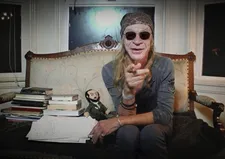 |
| Leon Vitali on Stanley Kubrick: "When he was mad he was really mad. But when he was kind it was almost like - please, it's too much, it's too much! " |
AKT: It comes full circle when you say that your last conversation with him had that same gentleness again.
LV: Yes!
AKT: Human beings can be both. We all are gentle and explosive to a degree.
LV: Yes, I always say, if you think of yourself and you think of all the emotions and the feelings that you go through, your disappointment, anger, elation, your pleasure, boredom - all of those things. Everybody goes through them. So did Stanley.
But the difference between Stanley and most people was that he experienced everything to the power of a million, gazillion. When he was mad he was really mad. But when he was kind it was almost like - please, it's too much, it's too much! He was that kind of person.
AKT: I want to ask you a few things about the unmade Aryan Papers. That was based on Wartime Lies. Wasn't there another project connected to the Harlan family? About the film industry during the Third Reich. Was that part of the same project or totally different?
LV: That was something quite different. It was something he'd wanted to do many years ago. I don't know why it got set aside. When you think of Stanley and all the films he made, and they are all such different genres. Even if they say, well Paths Of Glory and Full Metal Jacket, they're war films - but they are entirely different points of view.
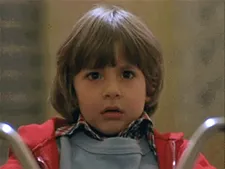 |
| Danny Lloyd as Danny Torrance in The Shining |
AKT: Totally different, yes.
LV: And the same with Strangelove. And I think, he always wanted to find a story about … Because it was about the actual book [Wartime Lies by Louis Begley], I don't know if you've read it?
AKT: Years ago.
LV: It's about the reminiscences of a young boy and how he experienced that thing. And was what he was talking about, was it really true. Or was it just fantasy and imagination that made it more than it really was? That's the crux of the book. That's what interested Stanley.
It was the psychology behind the situation and the fact that she [Tania, a Polish Jew] lived with a German officer during this whole time. Well not the whole time, it was a stage in that escaping from that situation. It's a fascinating story. It's a fascinating book.
AKT: It is. I wish it had become a Kubrick film.
LV: I wish too. But Schindler's List came along.
AKT: And the other story? The one about Veit Harlan and his making of Jud Süß? Wasn't there a plan to do that?
LV: There was. Yes, he wanted to. He ate this kind of stuff up, you know what I mean? He did and it is fascinating. I mean, you think, how could people get - especially who are artists, get sucked into that situation? They're being cruel, basically inhuman.
AKT: Feeling pulled into certain things is the subject of Eyes Wide Shut also. And then there is the German/Austrian connection with Arthur Schnitzler.
LV: Right, Schnitzler.
AKT: Did he give you the Dream Novella beforehand? The way he handed you The Shining, saying "Read this"?
LV: No, no, no! He didn't. He kept it very private and under wraps. And then he left what was at that time the finished script, the script that went out to people. He left it on my desk. And I got in at half past eight that morning. Before ten o'clock I'd read it. And I told him when he came down. I said, "I read it." He said, "You read it already?" Yeah, of course. You know, no script of Stanley's stayed the same.
My first script of Barry Lyndon was Scene 1 Duel - scene to be written. Scene 2 - scene to be written. And all the way through it says: Scene to be written. Everything was a development. He left everything open. Which is another thing I adored about him.
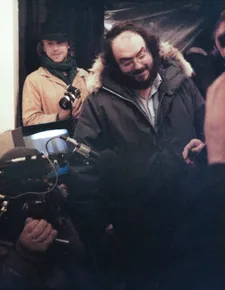 |
| Leon Vitali with Stanley Kubrick: "He experienced everything to the power of a million, gazillion." |
AKT: That he reacted to the world?
LV: Yeah, and to the work itself and what it suggested to him. You know how writers say - I let the book write itself? And he was very much a person who let a film make itself.
AKT: Well, with your great help!
LV: With lots of people's help.
AKT: A lot of filmworkers together.
LV: He was making great movies before I came along, but it was just wonderful to be a part of that process. He was so open. If he saw the film was moving in the direction, screw the script, this is more interesting. "It's an even better way to tell the story than I thought." He was very free-form.
AKT: When you were wearing those platform shoes [to play the Red Cloak] in Eyes Wide Shut was that because the actor who had that role before you was much taller?
LV: Much taller! Yeah, yeah, he was! But you see, I lived in the Seventies in London and I had platforms!
AKT: So you could manoeuver in them?
LV: Yeah.
AKT: You and shoe scenes - there's a theme. In Barry Lyndon you are in your stockings and the little boy wears your shoes. Is that how your job in The Shining came about? Because you were so good with the kid [David Morley as Bryan Patrick Lyndon] on Barry Lyndon, Kubrick wanted you to cast the children for The Shining?
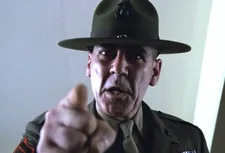 |
| R Lee Ermey as Gunnery Sergeant Hartman in Full Metal Jacket |
LV: Yeah, because I could make that boy focus. He was a very scatterbrained little kid. And I could make him focus when we were actually in front of the camera.
AKT: Like the drill sergeant [R. Lee Ermey as Gunnery Sergeant Hartman in Full Metal Jacket]?
LV: I didn't shout at him! But Stanley saw that. That's why. That's what he said when he was thinking about how to do that. He had a normal casting operation going in LA.
AKT: But he had seen you with the boy from Barry Lyndon?
LV: Yeah. It was two things. He wanted someone who could improvise because that's the best way to work with children. And he wanted someone who had an idea how to get focus into somebody or out of somebody. And that's how he first got interested in using me.
AKT: How do you get focus out of somebody?
LV: How do you get focus out of somebody? Well, you kind of immerse, it's an immersion. Certain people don't respond. They don't. Very often the older an actor is, I say actor, it could be anybody, the more difficult it is to shake free from the things you know are safe.
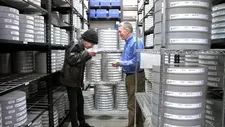 |
| Leon Vitali with Ned Price, VP Restoration for Warner Bros. |
AKT: Unlearn?
LV: Yes, unlearn. Picasso said it took him 60 years to unlearn everything he'd been taught. You know, it's true, it's absolutely true. There's such a truth in that and it leaves you so much freer.
Coming up - Leon Vitali on Stanley Kubrick being "nuts for animals", unknown nostalgia, Diane Arbus and Bruno Dumont's twins, and the creation of a masked ball.
Kubrick x 8 runs through May 27 with upcoming screenings of Dr. Strangelove Or: How I Learned To Stop Worrying And Love The Bomb; The Shining; Full Metal Jacket; Paths of Glory; The Killing; A Clockwork Orange, and Lolita.
Through a Different Lens: Stanley Kubrick Photographs is on exhibit at the Museum of the City of New York through October 28, 2018.
Filmworker is in cinemas in the US and out in the UK on May 18.








![Leon Vitali on the shoes he wore to play the Red Cloak in Eyes Wide Shut: "Much taller [the actor he replaced]! Yeah, yeah, he was! But you see, I lived in the Seventies in London and I had platforms!"](/images/newsite/Leon_Vitali_3_225.webp)













